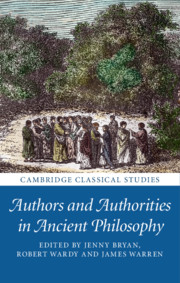
-
Select format
-
- Publisher:
- Cambridge University Press
- Publication date:
- September 2018
- September 2018
- ISBN:
- 9781108186650
- 9781316510049
- Dimensions:
- (216 x 138 mm)
- Weight & Pages:
- 0.64kg, 382 Pages
- Dimensions:
- Weight & Pages:
You may already have access via personal or institutional login
Book description
Ancient Greek and Roman philosophy is often characterised in terms of competitive individuals debating orally with one another in public arenas. But it also developed over its long history a sense in which philosophers might acknowledge some other particular philosopher or group of philosophers as an authority and offer to that authority explicit intellectual allegiance. This is most obvious in the development after the classical period of the philosophical 'schools' with agreed founders and, most importantly, canonical founding texts. There also developed a tradition of commentary, interpretation, and discussion of texts which itself became a mode of philosophical debate. As time went on, the weight of a growing tradition of reading and appealing to a certain corpus of foundational texts began to shape how later antiquity viewed its philosophical past and also how philosophical debate and inquiry was conducted. In this book leading scholars explore aspects of these important developments.
Contents
Metrics
Altmetric attention score
Full text views
Full text views help Loading metrics...
Loading metrics...
* Views captured on Cambridge Core between #date#. This data will be updated every 24 hours.
Usage data cannot currently be displayed.
Accessibility standard: Unknown
Why this information is here
This section outlines the accessibility features of this content - including support for screen readers, full keyboard navigation and high-contrast display options. This may not be relevant for you.
Accessibility Information
Accessibility compliance for the PDF of this book is currently unknown and may be updated in the future.


